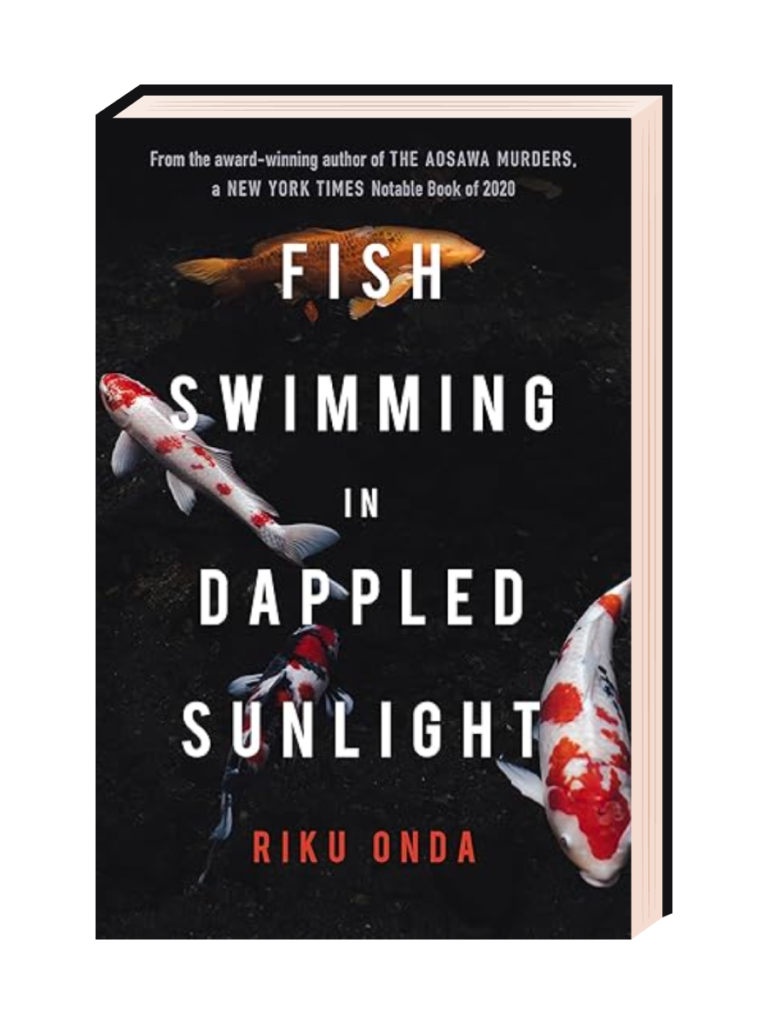On the final night in their Tokyo apartment, Aki and Hiro have one goal in mind: to make the other confess to murder.
Ever since their trek to the mountains, where their guide died suddenly on the trail, each has become consumed by doubt and convinced the other is the killer. With their relationship now over, they are determined to extract the truth before the night is through.

Fish Swimming in Dappled Sunlight
Riku Onda · Translated from the Japanese by Alison Watts
204 pages
A twisting psychological thriller: Fish Swimming in Dappled Sunlight
Riku Onda’s Fish Swimming in Dappled Sunlight is a deeply introspective take on memory, doubt, and the devastating effects that concealing the truth can have on our lives. In it, Aki and Hiro have spent the last year avoiding what took place on the mountain, allowing their doubts about the other to grow and fester. The death of their guide has shattered their relationship, and now, with little time remaining, they engage in a battle of wills to coerce the truth out of the other and finally move on from the crime that’s destroyed them.
Told from the perspective of both characters in alternating chapters, the story takes us through the serendipitous start to their relationship up until their final night together in their currently, nearly empty apartment. With most of their belongings gone, they sit on the floor, drinking alcohol from atop a suitcase they use as a makeshift table. They force each other to talk, rehashing the events that led them there, and slowly, details of the tragedy come to light. However, in trying to figure out who is responsible and what exactly happened on the mountain, they may end up confessing to more than just a murder.
Onda writes a mystery that continues to twist as Aki and Hiro unearth repressed memories and piece together the fragments of their past. As we get deeper into the novel, we realize the murder is not at the forefront of the story, but rather, the identity of our two characters. We, along with them, learn that their lives are more intricately connected than once believed. Unfortunately, there are truths that were hidden from the pair that have the power to completely destroy everything between them.
The novel partly revolves around a forbidden romance that I, to say the least, wasn’t a fan of. Regardless, it does add vital tension to the narrative and places our characters in a despairing predicament. Their relationship, one that was once full of innocence and hope, has turned into a living hell, warped by doubt and insecurity. Aki and Hiro have lived in denial of this for far too long, clinging desperately to a fantasy and to each other, but tonight they finally bring themselves to admit to it.
In Fish Swimming in Dappled Sunlight, as with its title, Onda uses the concept of komorebi metaphorically throughout her writing. Komorebi is a Japanese word to describe the dappled sunlight that filters through trees, creating soft, shifting patterns of light that evoke an ethereal, dreamlike atmosphere. The contrast of light and shadow are an important part of traditional Japanese aesthetics, thought to bring out the beauty of objects and surroundings. Here, however, Onda uses it as something unsettling, describing the feeling of being trapped in your own mind, caught somewhere between light and darkness or lost in murky memories.
“I love that earnest expression of his, the one that comes over him when he is thinking deeply about something. It’s tinged by shadows. As if glimpses of a melancholy that is ordinarily well controlled slip through the defenses around his heart.”
Ultimately, Fish Swimming in Dappled Sunlight is a suffocatingly accurate depiction of what it’s like to battle with dark thoughts. It describes how we so often give a performance to cover up the worst of ourselves and create illusions to avoid dealing with painful realities. Much of the time, deluding ourselves into believing everything is fine is the only way to survive.
But maybe, sometimes, it’s better to just let yourself live in the gray area. You’ll likely leave this novel questioning if acknowledging the truth is always worth the cost.